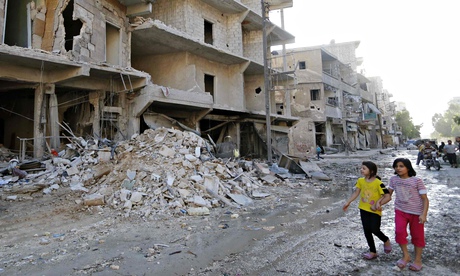Bashar al-Assad is west's ally against Isis extremists, says Syria.

Girls walk past damaged buildings at a site hit by what activists said was a barrel bomb dropped by forces loyal to Syria's president Bashar al-Assad in Aleppo's al-Myassar neighbourhood. Photograph: Hosam Katan/Reuters
Syria is determined to "eliminate" the Sunni extremist group Isis, according to a senior minister, who urged western countries to recognise "new realities" by joining the battle against terrorism and ending their support for rebels trying to overthrow president Bashar al-Assad.
"The only way to resolve the situation is to work with president Assad," Faisal Mekdad, Syria's vice foreign minister, told the Guardian. Mekdad said that "many countries" were now seeking security cooperation with Damascus, but "security matters could not be separated from the political cooperation".
He rejected suggestions that Assad is in league with Isis, which controls large parts of northern and eastern Syria as well as contiguous areas of Iraq. Assad's enemies accuse him of tolerating the group or tacitly cooperating with it to foment fighting between rival rebel units and present himself as a secular bulwark against al-Qaida and jihadi fanaticism.
"I know the rumours," Mekdad said. "But to those who claim that Syria is not doing its best to combat this group, I answer that if these extremists – Jabhat al-Nusra, the Free [Syrian] Army and Isis – are killing themselves and fighting for more influence and expansion, do you think we are sad? But the Syrian army has its priorities and we shall decide what to do next."
The Free Syrian Army, backed by the US, Britain, EU, Turkey and the Gulf states, insists that it is the only group capable of defeating Isis and Jabhat al-Nusra while bringing about democratic change in Syria. Isis – originally the Islamic State in Iraq and the Levant – now calls itself the Islamic State. Latest estimates say 170,000 people have been killed since the anti-Assad uprising began in March 2011. Millions have been made homeless.
Mekdad, dismissing what he called cheap propaganda, used a wide-ranging interview to broadcast Syria's determination to defeat Isis with the help of Iraq and "all those who are willing to fight terrorism". As the government's most articulate spokesman, his arguments clearly echo Assad's views, which will be heard when he is inaugurated for a new presidential term this week.
European countries, including Britain, were changing their minds about Syria, Mekdad suggested. "Deep in their hearts they know that what they did is a grave crime against the people of Syria. Thinking that the regime would fall in few weeks [in 2011] has led to the flourishing of terrorism inside Syria and threatening the security of European countries themselves. They have started to understand that what is happening in Syria is not a revolution but a threat to Europe.
"Many countries are approaching us to establish cooperation on security matters. We told all of them that security matters could not be separated from political cooperation."
Mekdad was "not aware" that Britain had made any such approach. Among EU countries, Germany is thought most likely to go down the path of rapprochement, according to well placed Syrian sources. Thousands of Europeans, including an estimated 400 Britons, are thought to have fought in Syria. The attack in May on the Jewish museum in Brussels by a Frenchman who spent a year in Syria was widely seen as a wake-up call about the risks posed by returning jihadi fighters.
Assad's re-election last month – though the vote was held only in government-held areas – must change calculations, Mekdad argued. "The overall situation is improving. The government has more self-confidence. President Assad will be sworn in soon for a new term of office. The British, Americans, the French and Europeans in general have to change and accommodate themselves to the reality of developments in Syria. And they have to respect the will of the Syrian people. I hope that will happen, although I have my doubts."
Accusations of war crimes carried out by Syrian government forces were propaganda, he claimed. "This is politicisation and a continuation of the onslaught by European countries."
Mekdad attacked Saudi Arabia, Qatar and Turkey for backing the rebels. But he suggested that Syria's position in the Arab world was improving with signs of growing support from Egypt, where President Abdel Fatah al-Sisi shares Assad's hostility to the Muslim Brotherhood. Neighbouring Jordan is now reportedly balking at US plans to expand training for Free Syrian Army fighters on its soil.
Syria still wanted a political solution to the conflict despite the failure of the Geneva II talks earlier this year, but only after defeating terrorism, Mekdad said.
Stefan de Mistura, the Swedish-Italian diplomat appointed to replace Lakhdar Brahimi as UN envoy, must remain neutral, he warned – and recognise the "new realities" after Assad's election.
Mekdad also dismissed suggestions that an agreement on Iran's nuclear programme would mean reduced support from Tehran. Backing from Iran, the Lebanese Shia organisation Hezbollah – and Russia – has been crucial to Assad for the past three years. "We are not afraid of any Iranian-American-European rapprochement," Mekdad said. "We have every confidence in the Iranian leadership and the strategic nature of relations between Syria and the Islamic Republic."